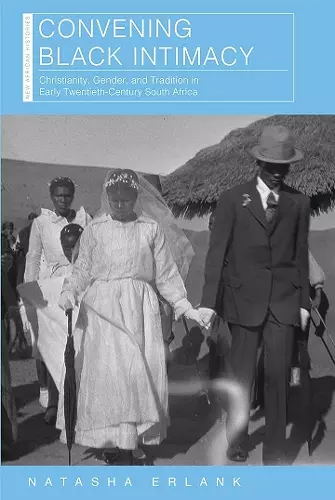Convening Black Intimacy
Christianity, Gender, and Tradition in Early Twentieth-Century South Africa
Format:Hardback
Publisher:Ohio University Press
Published:8th Nov '22
Should be back in stock very soon
This hardback is available in another edition too:
- Paperback£27.99(9780821424995)

This social history of twentieth-century Black intimacy and family life in South Africa is the first book to demonstrate the singular role of Christianity in reshaping sexual and marital traditions. It is a must-read for scholars interested in the politics of gender, sexuality, and family in South Africa, as well as for historians of Christianity.
An unprecedented study of how Christianity reshaped Black South Africans’ ideas about gender, sexuality, marriage, and family during the first half of the twentieth century.
This book demonstrates that the primary affective force in the construction of modern Black intimate life in early twentieth-century South Africa was not the commonly cited influx of migrant workers but rather the spread of Christianity. During the late nineteenth and early twentieth centuries, African converts developed a new conception of intimate life, one that shaped ideas about sexuality, gender roles, and morality.
Although the reshaping of Black intimacy occurred first among educated Africans who aspired to middle-class status, by the 1950s it included all Black Christians—60 percent of the Black South African population. In turn, certain Black traditions and customs were central to the acceptance of sexual modernity, which gained traction because it included practices such as lobola, in which a bridegroom demonstrates his gratitude by transferring property to his bride’s family. While the ways of understanding intimacy that Christianity informed enjoyed broad appeal because they partially aligned with traditional ways, other individuals were drawn to how the new ideas broke with tradition. In either case, Natasha Erlank argues that what Black South Africans regard today as tradition has been unequivocally altered by Christianity.
In asserting the paramount influence of Christianity on unfolding ideas about family, gender, and marriage in Black South Africa, Erlank challenges social historians who have attributed the key factor to be the migrant labor system. Erlank draws from a wide range of sources, including popular Black literature and the Black press, African church and mission archives, and records of the South African law courts, which she argues have been underutilized in histories of South Africa. The book is sure to attract historians and other scholars interested in the history of African Christianity, African families, sexuality, and the social history of law, especially colonial law.
Recommended. * Choice *
“This is a provocative recasting of fundamental topics in southern African historiography: love, marriage, religion, gender. Natasha Erlank argues that the major force restructuring southern Africans‘ intimate lives was Christianity, not migrant labor. A masterful analysis of how religion shaped all aspects of Southern Africans’ public and private lives in the twentieth century.”
“Filled with memorable characters and riveting narratives, this book admirably captures the tangle of Christianity, gender and tradition. With an astute eye, Natasha Erlank elucidates the fine-grained intricacies of love, courtship, marriage, and sexuality through deeply researched and richly detailed thematic case studies—an essential contribution to feminist histories of Christianity in Africa.”
“Convening Black Intimacy skillfully situates Christian belief as pivotal to gender and sexual transformations in twentieth-century South Africa. By exploring both conservative and emancipatory strains of Christian thought and practice, Natasha Erlank powerfully reveals African intellectual debates and intimate relations as deeply intertwined domains. This is an important contribution to African intellectual history and gender history.”
ISBN: 9780821424988
Dimensions: unknown
Weight: unknown
288 pages